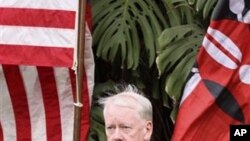The United States has issued travel bans on four senior members of the Kenyan government and one prominent businessman for alleged involvement in narcotics trafficking.
Speaking in Mombasa, U.S. Ambassador to Kenya Michael Ranneberger declared war on narcotics trafficking in Kenya. The U.S. envoy called for Kenya's citizens and politicians to help fight the illicit trade that has been booming in recent years.
Mombasa is Kenya's largest port city and a notorious center of drug trafficking in the region, particularly heroin and cocaine. Ranneberger said the trade was a dangerous and growing problem for Mombasa and all Kenya.
"Kenya has a very serious problem with narcotics trafficking," he said. "It has been a problem that has been growing for years. When you go down to the coast, in particular, all the communities talk about that. They all talk about the impact on families, on rising crime. It has been a problem for quite some time. I think it has been a steadily - as I call it - a serious growing threat."
As part of U.S. efforts to curb crime in the region, Ranneberger said the U.S. Drug Enforcement Administration would set up a regional office in Kenya within the next few months. According to Ranneberger, Kenya's drug problem has been on the U.S. radar for a while, and opening a DEA office is the result of years of planning.
While Kenya is involved in significant drug flows to the rest of Africa and Europe. Relatively little of the country's drugs make it to the United States. But Ranneberger, who frequently rails against corruption in Kenya, says the fight against drugs is part of the fight against corruption.
"This is part and parcel of the culture of impunity," he said. "This sort of thing cannot go on without corruption and money being paid to people. So it is all part of an effort to fight the culture of impunity."
The ambassador announced in Mombasa that the United States had issued travel bans on "four senior government officials and one prominent businessman" who are allegedly involved in the illicit trade. While Ranneberger would not confirm any of those included, he said the identities of drug kingpins in Kenya were among the "coast's worst kept secrets."
The 2010 World Drugs Report issued by the United Nations Office on Drugs and Crime lists Kenya, along with Egypt and Mauritius, as having the highest percentage of opiate users in Africa. The report also found that in 2008 two percent of those arrested for trafficking in Afghanistan were Kenyan nationals.
US Issues Travel Ban on Senior Kenyan Government Officials




